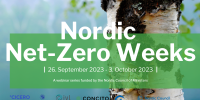Webinar series: Nordic Net-Zero Weeks

Science calls for immediate and deep emission reductions across all sectors to avoid accelerating climate change. Hence, countries that have the tools, know-how and institutional and financial capacity must step up and lead by example. The Nordic region is well prepared to take on this responsibility and has a strong track record of leading by example.
In this webinar series on Nordic climate neutrality, we will share insights on a set of topics of relevance for achieving climate neutrality in the Nordic region, aiming to share experiences and inspire across borders.
The webinar series is a part of the project “Nordic Stocktake and Vision – Pathways to Climate Neutrality”, carried out by a consortium consisting of the organizations CONCITO, CICERO, IVL Swedish Environmental Research Institute, University of Iceland and Reykjavik University, and Tyrsky Consulting. The project is a part of the initiative “Climate transition in the Nordics” to support the Nordic Vision 2030. The overall aim of the Nordic Vision is to become the most sustainable and integrated region in the world by 2030.
Webinar details and registration links:
26/09, 10:30-12:00 (CET): Just a Carbon Pricing Policy or a Just Carbon Pricing Policy? (University of Iceland & Reykjavik University)
Effective carbon pricing is necessary to create the enabling environment for mitigation. In this webinar we will discuss the current state of carbon pricing in the Nordic countries, the effectiveness of carbon pricing and implications of carbon pricing for a just transition. We also will discuss the future of carbon pricing for example in the context of EU regulations and the Paris Agreement.
Please register for the webinar on carbon pricing here: https://forms.office.com/e/SEE7LpxsDx
Agenda:
Introduction
Amanda Hagerman
The state of carbon pricing in the Nordic countries
Dr. Daði Már Kristófersson
National and EU climate policies in conflict?
Dr. Liski Matti
Agriculture & carbon pricing – the Danish case
Torsten Hasforth
Carbon pricing and justice
Sigríður Ingibjörg Ingadóttir
27/09, 08:30-10:00 (CET): Future of transport biofuels in the Nordics (Tyrsky Consulting & IVL)
Biofuels have been one of the key tools to cut emissions from road transport in the Nordic countries. However, concerns about fuel prices and sustainability have led to some countries revisiting their plans. The webinar discusses the future of biofuel blending obligations and the alternatives Nordic policymakers have available.
Please register for the webinar on biofuels here: https://forms.office.com/e/NPz2YkUiqu
Agenda:
09:30
Opening and technical issues
Oras Tynkkynen, Tyrsky Consulting
09:35
Welcoming words
Maja Cederlund, Project Leader, Swedish Environmental Protection Agency
09:40
State of play on biofuels in the Nordics
Henrik Gudmundsson, Senior Advisor, CONCITO
09:50
Keynote presentation 1: the blending obligation and its alternatives
Katarina Wärmark, Climate Analyst, Swedish Environmental Protection Agency
10:05
Keynote presentation 2: the potential of synthetic fuels in the Nordics
Jacob Munch, Adviser, Nordic Energy Research
10:20
Short reactions from Nordic stakeholders
FI: Kimmo Salminen, Vice President Pricing and Market Intelligence, Neste
NO: Wilhelm Kiil Rød, Public Affairs Manager St1 Norway
SE: Julia Hansson, Senior Project Leader and Expert, IVL
10:35
Q&A and discussion on possibilities for Nordic cooperation
11:00
The end
Opening and technical issues
Oras Tynkkynen, Tyrsky Consulting
29/09, 14:00-15:30 (CET): Decarbonizing the Nordic power system – Securing supply and reducing unwanted distributional consequences (CICERO)
In this webinar, we discuss challenges and opportunities for the Nordic power system given ambitious climate policy targets, broad electrification, and the fast growth of renewable electricity production. A larger share of intermittent power production from wind and solar production means an increased demand for non-fossil balancing power. We assess the opportunities for developing renewable energy sources and balancing power in the Nordics, as well as energy efficiency, flexibility, and storage improvements. There is likely an underdeveloped potential to secure power supply, increase efficiency, constrain electricity prices, and reduce unwanted distributional effects and negative impacts on nature through strengthened Nordic collaboration.
Please register for the webinar on decarbonizing the Nordic power system here: https://cicero-is.zoom.us/webinar/register/WN_p3YOmctKStqBbVid2gMGTw#/registration
Agenda:
14.00 - 14.15
Introductory
Marie Karlberg, NMR-sekretariatet
14.05 – 14.15
Introduction
The power system and electrification in the Nordics – Potential and challenges
Asbjørn Torvanger, CICERO
14.15-14.30
The role of the power systems in Norway and all Nordics in the green transition.
How can we secure sufficient green power flexibility?
How can the biggest gains from Nordic collaboration be realized?
Jan Bråten, Statnett
14.30-14.45
How much can wind power and solar energy contribute to the green transition in the Nordics?
What about social acceptance?
Kristin Linnerud/Eirik Ogner Jåstad, NMBU.
14.45-15.00
How to prioritize between climate, energy, and nature?
Truls Gulowsen, Naturvernforbundet
15.00 -15.25
Comments from steering group and open discussion
15.25 – 15.30
Closing remarks
Marie Karlberg, NMR-sekretariatet
Introductory
Marie Karlberg, NMR-sekretariatet
2/10, 14:00-15:30 (CET): Consumption-based emissions analyses – how and why? (CONCITO).
In this webinar, we will explore the role of consumption-based emissions modelling and accounting. Our three keynotes will present their work with this, as well as how they have worked with the results in communicating climate impacts globally, nationally, and locally, and in relation to policy and planning for sustainable transitions. Key speakers are Daniel Moran from NILU, Norway; Michael Minter and Charlotte Jensen from CONCITO, Denmark; and Katarina Axelsson from SEI, Sweden. Please register for the webinar on consumption-based emissions here: https://forms.office.com/e/ntVS6JetRd
3/10, 09:30-11:00 (CET): CCS and CDR in the context of Nordic carbon neutrality (IVL & Tyrsky Consulting)
In this webinar, speakers from across the Nordic countries will share experiences on Carbon Capture and Storage (CCS) and Carbon Dioxide Removal (CDR). We will discuss what the most significant opportunities and barriers are and in what way Nordic collaboration could make significant contributions to support development of CCS/CDR in the Nordic region.
Please register for the webinar on CCS and CDR in the context of Nordic carbon neutrality here: https://forms.office.com/e/qZwFdLYxA8
Agenda
09:30
Opening and introduction
Mia Nielsen, KEFM
09:35
Presentations
Tina Schon, Danish Energy Agency: Experiences from initial phase of CCS/CDR support scheme and way forward.
Oras Tynkkynen, Member of Finnish Parliament: End date for releasing carbon - a policy breakthrough?
Ólafur T. Gudnason, Policy & Communications, Carbfix, Iceland: Mineralisation storage, innovation and business development for carbon neutrality
Martijn Smit, Northern Lights, Norway: Developing CO2 transportation and storage as a service
Prof. Filip Johnsson, Chalmers, Sweden: Potential, opportunities and risks associated to CCS applied to fossil and biogenic CO2
10:30
Moderated panel discussion
- What are the most significant opportunities and barriers?
- In what way can Nordic coordination/collaboration make significant contributions to support development of CCS/CDR (in the light of carbon neutrality targets)?
- Closing remark from each panellist.
10:55
Closing remarks
Mia Nielsen, KEFM
Opening and introduction
Mia Nielsen, KEFM
